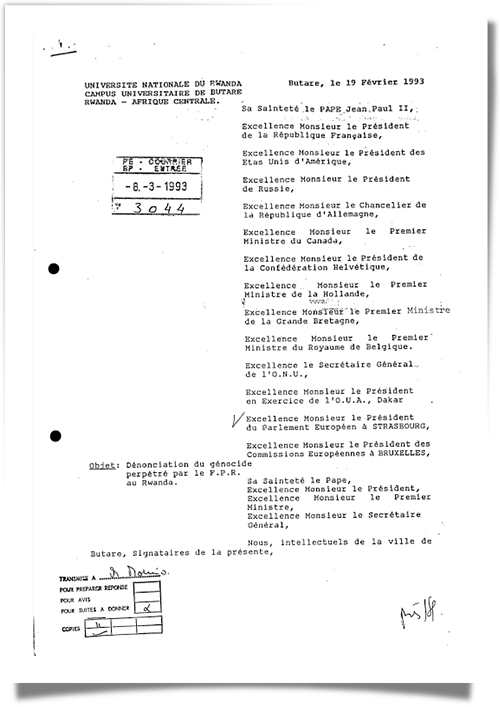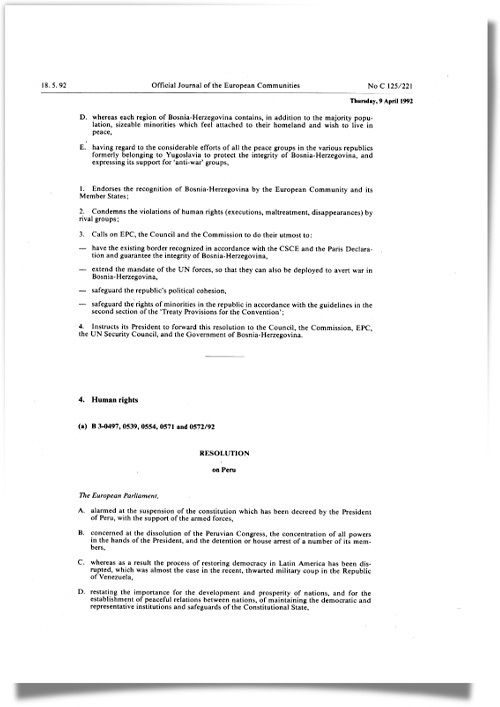En tant qu’institution démocratique, le Parlement européen est très souvent sollicité pour des questions liées aux violations des droits de l’homme. Le mandat du Président Klepsch a tout particulièrement été marqué par des conflits internationaux majeurs, tels que le génocide au Rwanda, la crise du Golfe ou encore les événements survenus au Pérou lors du coup d’État de Fujimori; événements au cours desquels la Communauté européenne est intervenue pour faire respecter la démocratie et les droits de l’homme.
La tragédie de la Yougoslavie
La situation en ex-Yougoslavie a particulièrement marqué les esprits, des termes tels que «purification ethnique», «massacre» ou encore «tragédie» étant utilisés pour la première fois depuis la fin de la Seconde Guerre mondiale dans le contexte d’une guerre en Europe. L’ex-Yougoslavie figure à l’ordre du jour de nombreux débats passionnés lors des sessions du Parlement européen. Plus de 200 propositions de résolution sont déposées et des centaines de pétitions introduites.
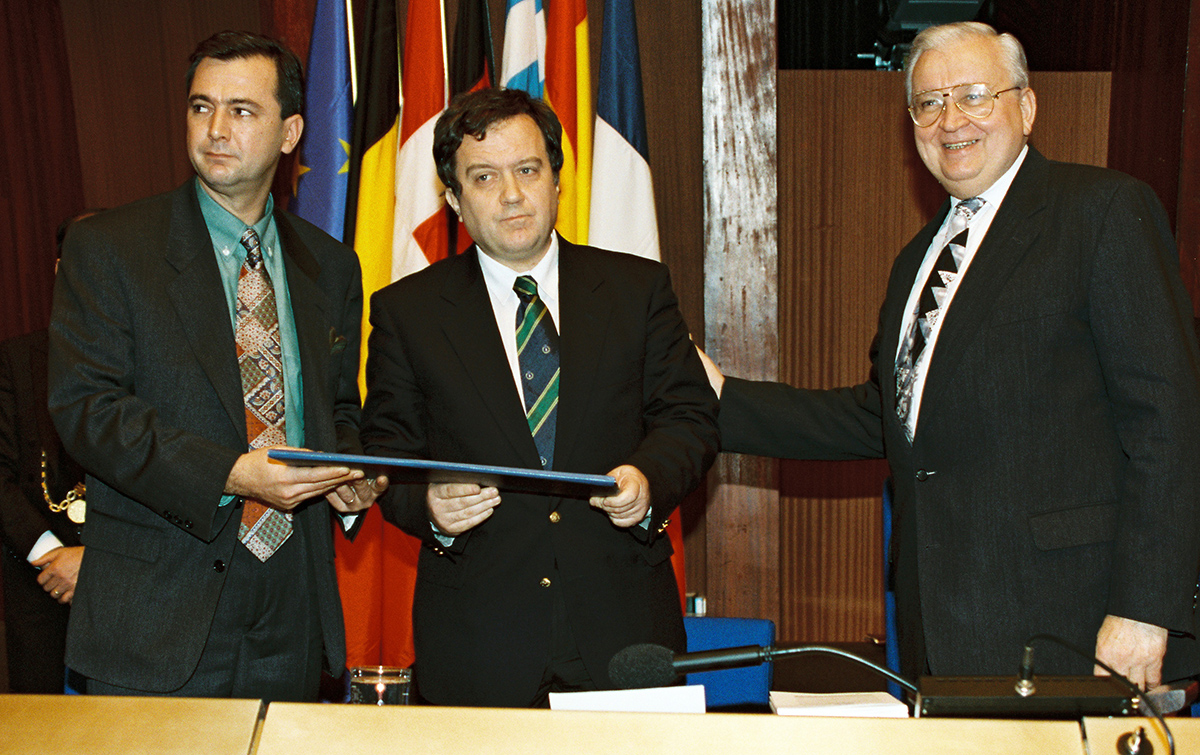 Le prix Sakharov 1993 est décerné à Oslobodenje Sarajevo, représenté par Zlatko Dizdarević. Sur la photo: Zlatko Dizdarević, Egon Klepsch, Président du Parlement européen © Union européenne, 1993
Le prix Sakharov 1993 est décerné à Oslobodenje Sarajevo, représenté par Zlatko Dizdarević. Sur la photo: Zlatko Dizdarević, Egon Klepsch, Président du Parlement européen © Union européenne, 1993
Des représentants de groupes politiques et d’associations pour la paix et les droits de l’homme issus de toute l’Europe prennent contact avec le Président Klepsch pour lui demander d’intervenir auprès des différentes nations concernées, afin de mettre fin à la violence.
La correspondance ci-dessous illustre le contenu de ces ferventes sollicitations:
«Il est impératif de mettre fin à toutes les violations de la Convention de Genève et d’assurer le respect des droits de l’homme. Nous vous adressons une copie de cette proclamation signée, ainsi qu’à toutes les personnes qui sont susceptibles de jouer d’influence sur les conflits. Nous demandons... [que vous] vous engagiez à nos côtés dans la construction d’une Europe unie et solidaire»
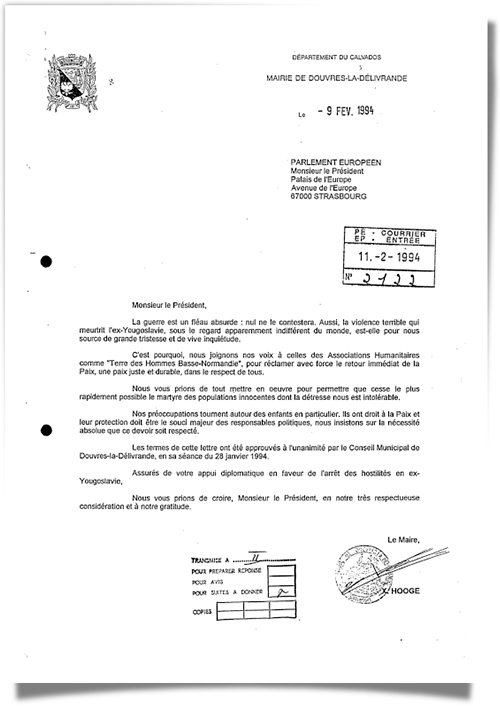 Correspondance: Demandes en faveur d’une intervention pour arrêter la guerre dans l’ex-Yougoslavie (Téléchargez le document en anglais/français/néerlandais ici – PDF)
Correspondance: Demandes en faveur d’une intervention pour arrêter la guerre dans l’ex-Yougoslavie (Téléchargez le document en anglais/français/néerlandais ici – PDF)
Les relations avec la Chine
Le Président Klepsch s’efforce également de dialoguer avec des pays où les relations internationales, en particulier avec la Communauté européenne, sont entravées par des conflits raciaux, comme l’Afrique du Sud ou la République populaire de Chine. Le Parlement adopte plusieurs résolutions sur la question des droits de l’homme en Chine, au Tibet et à Hong Kong. Ces résolutions sont perçues par la Chine comme une ingérence répétée de la Communauté européenne dans ses affaires intérieures et provoquent de vives réactions de la part du gouvernement chinois, comme en témoigne la correspondance entre l’ambassadeur de Chine auprès des Communautés européennes et le Président du Parlement européen.
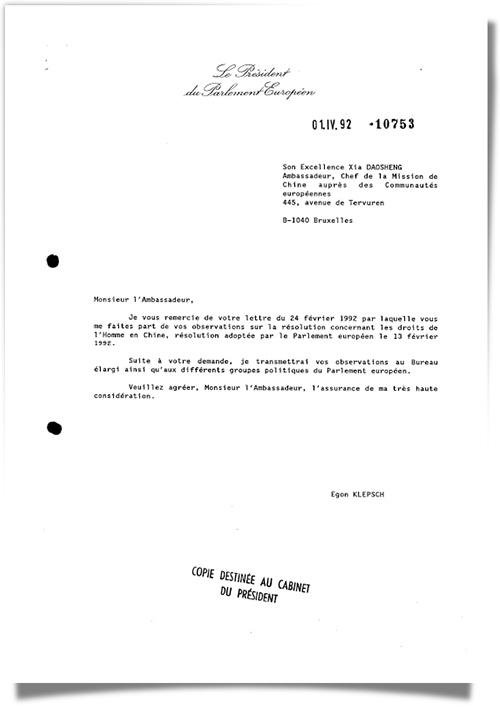 Correspondance: observations sur la résolution du Parlement européen du 13 février 1992 concernant les droits de l’homme en Chine (Téléchargez le document en français ici – PDF)
Correspondance: observations sur la résolution du Parlement européen du 13 février 1992 concernant les droits de l’homme en Chine (Téléchargez le document en français ici – PDF)
C’est dans ce contexte que le Président Klepsch est invité à effectuer une visite de sept jours en République populaire de Chine fin 1993. Cette rencontre suscite de vives réactions au sein de l’opinion publique et, à la suite de cette visite, plusieurs chefs de groupes politiques reprochent à Egon Klepsch de ne pas avoir fait part aux autorités chinoises des préoccupations du Parlement européen en matière de droits de l’homme - telles qu’elles avaient été exposées dans de nombreuses résolutions du Parlement européen.
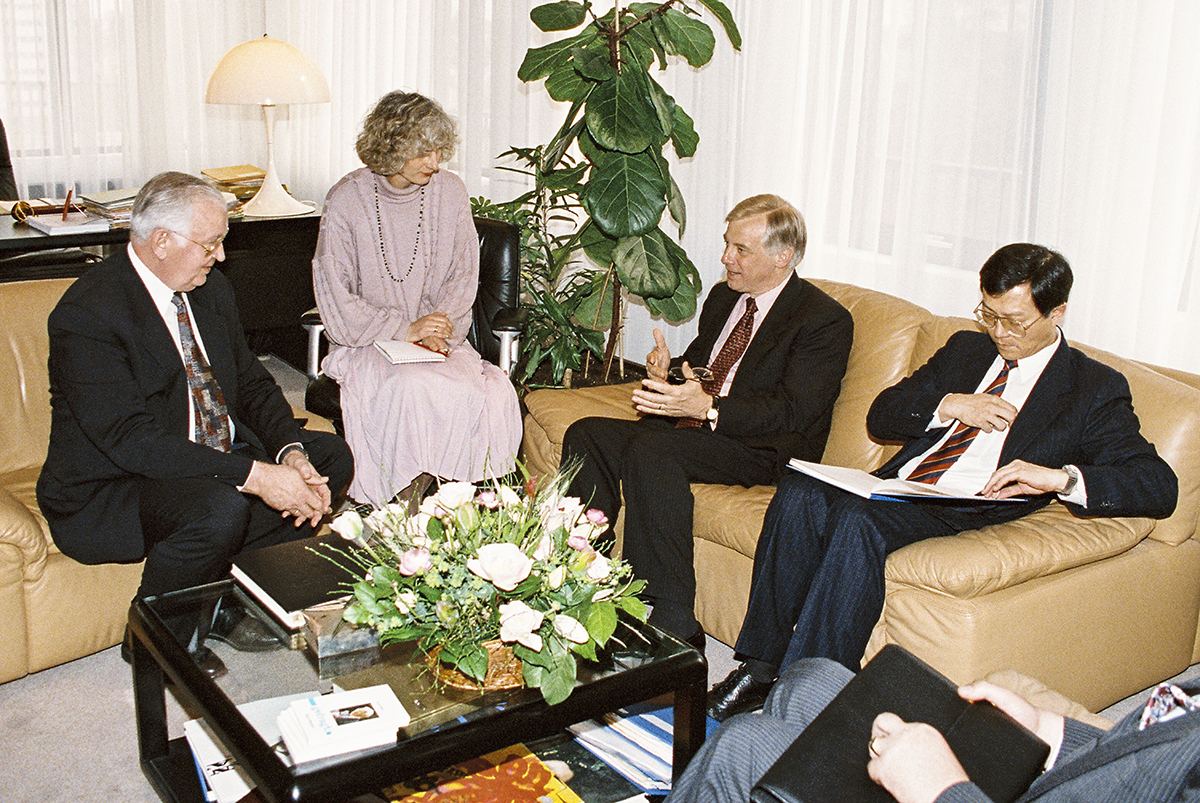 Egon Klepsch, Président du Parlement européen, rencontre Chris Patten, gouverneur de Hong Kong, au Parlement européen à Bruxelles. © Communautés européennes, 1993
Egon Klepsch, Président du Parlement européen, rencontre Chris Patten, gouverneur de Hong Kong, au Parlement européen à Bruxelles. © Communautés européennes, 1993
«Lorsque vous avez évoqué votre visite en République Populaire de Chine à la réunion du Bureau élargi du 29 septembre 1993, plusieurs présidents de groupe vous ont demandé de porter à la connaissance des autorités chinoises les préoccupations du Parlement européen en matière de droits de l’homme, telles qu’elles ont été explicitées par maintes résolutions du Parlement.»
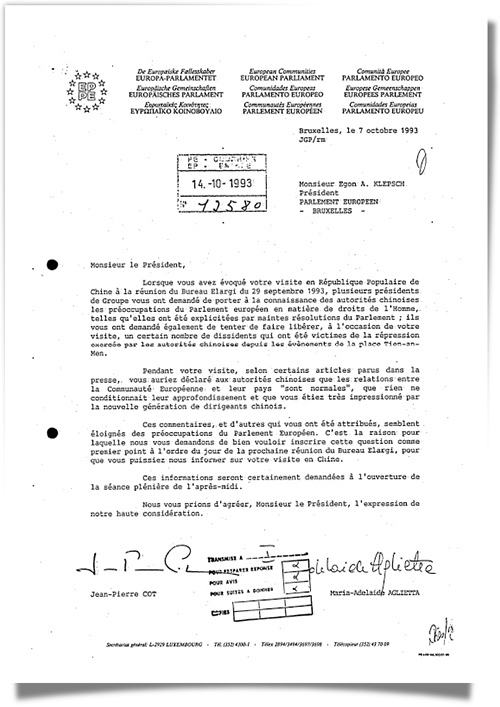
Les relations avec la Russie
En revanche, au cours du mandat d’Egon Klepsch les relations avec la Russie s’avèrent être positives. À plusieurs reprises, le Parlement de la Fédération de Russie demande ainsi l’assistance du Parlement européen, comme en avril 1992 pour la mise en place d’une commission du contrôle budgétaire, et pour la surveillance de la mise en œuvre de l’aide communautaire. En février 1994, peu après les élections législatives en Russie, pour lesquelles l’Union européenne disposait d’observateurs, Egon Klepsch se rend à Moscou pour une visite qu’il qualifie de très utile pour comprendre la situation en Russie et pour consolider les relations entre le pays et le Parlement. Cette visite intervient à l’aube des accords de partenariat et de coopération entre la Russie et l’Union et de la création du Conseil de coopération interparlementaire.
Retour sur le mandat d’Egon Klepsch
Dans son discours de fin de mandat, Egon Klepsch revint sur l’évolution des affaires internationales au cours de sa présidence:
«Au cours de mon mandat, nous avons dû assister douloureusement à de nombreux événements survenus autour de nous sans pouvoir exercer une réelle influence. La tragédie de la guerre en ex-Yougoslavie en fait partie, ainsi que les tragédies du Rwanda ou de la Somalie. En revanche, nos espoirs, notre ferveur et nos convictions en matière de paix et de justice se sont concrétisés dans d’autres régions du monde. L’Afrique du Sud a connu pour la première fois des élections libres. Au Moyen-Orient, le processus de paix a pris une forme concrète et l’Union européenne devra maintenir ses contributions matérielles, politiques et morales.»
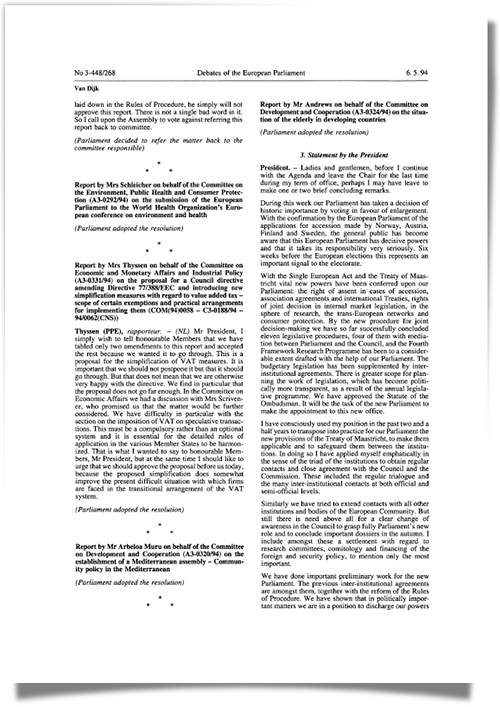
Discours de fin de mandat d’Egon Klepsch - (Téléchargez le document ici – PDF)
